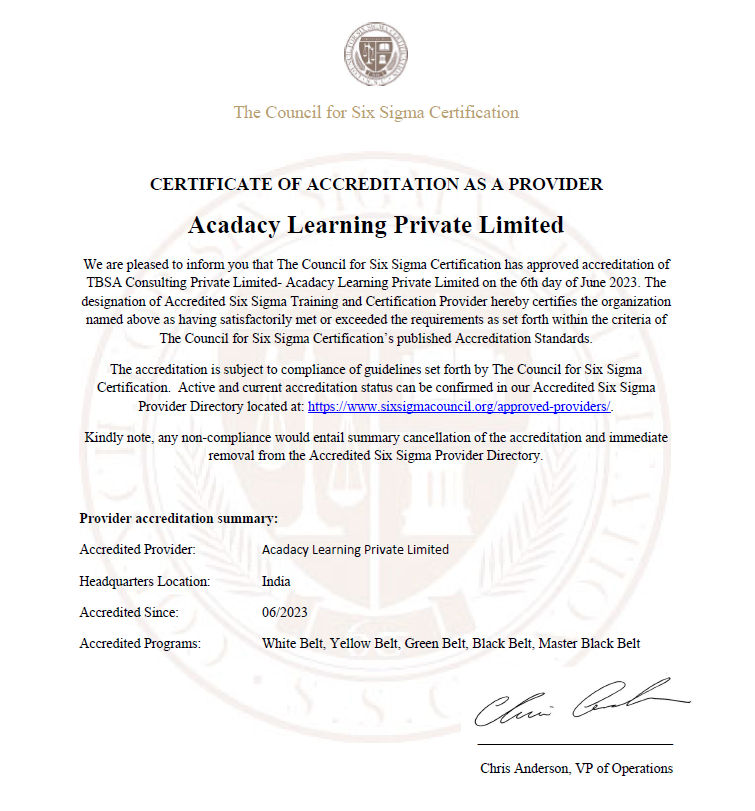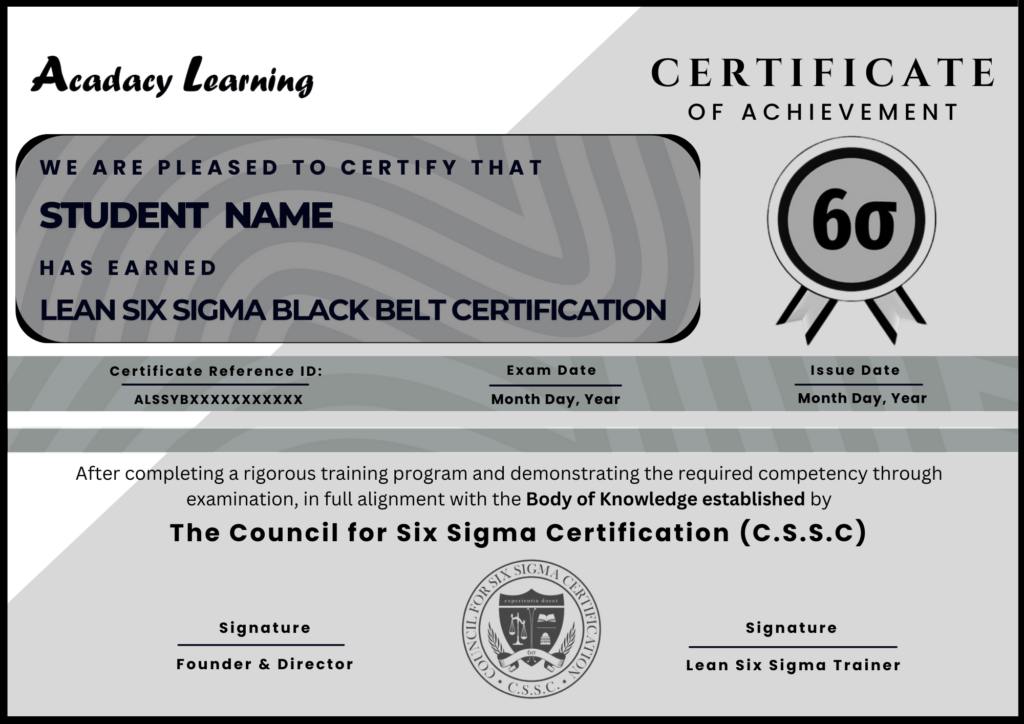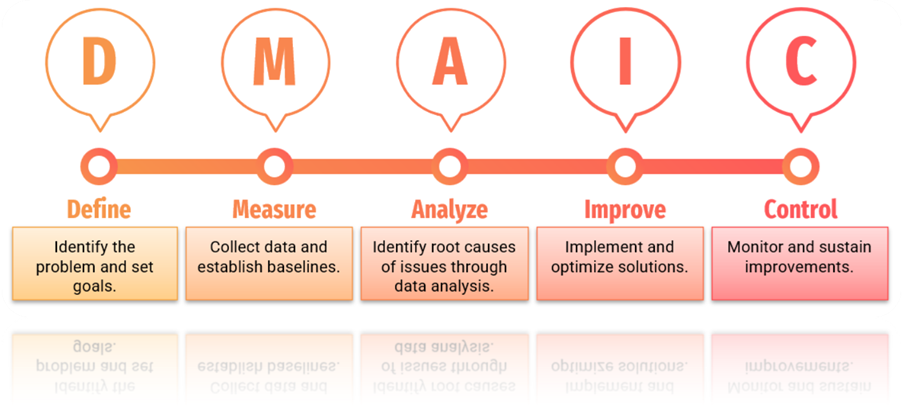See how our program has empowered students with the skills, confidence, and expertise to succeed. Hear their success stories!
Become a Certified Lean Six Sigma Black Belt Professional
"Transform your career with in-depth training and certification in Lean Six Sigma Black Belt. Lead projects, optimize processes, and become a change-maker in your organization."
"Master Process Improvement & Drive Business Excellence"
What is Lean Six Sigma Black Belt?
A Lean Six Sigma Black Belt is a process improvement expert skilled in eliminating waste, reducing defects, and optimizing efficiency. Black Belts lead high-impact projects using data-driven decision-making and advanced problem-solving techniques.
Lean Six Sigma Black Belt is the most recognized training and certification worldwide.

Earn Internationally Accredited Lean Six Sigma Certification
"Join the ranks of industry leaders with a globally recognized certification. Our training is accredited by the Council for Six Sigma Certification and aligned with their official Body of Knowledge."
About Our International Accreditation
We are an Internationally Accredited Training Provider by the Council for Six Sigma Certification (CSSC). As an Authorized Training Provider in India, we deliver top-tier Lean Six Sigma Black Belt Training, fully aligned with industry standards and globally recognized certification.


Earn a Lean Six Sigma Black Belt Certificate & Digital Badge
Upon successfully completing of the course you will receive a certificate and digital badge to showcase your skill milestones on Social Media.
A formal recognition of your achievement, perfect for adding to your resume or LinkedIn profile.
A shareable, verified badge that you can proudly display on your social media profiles and professional networks.


Why Choose Our Training?
Our Lean Six Sigma Black Belt Training is Globally Accredited and Aligned with the Council's Body of Knowledge
- Accreditation: Our training program is internationally recognized and accredited by the Council for Six Sigma Certification (CSSC), ensuring you receive high-quality education that meets global industry standards.
- Comprehensive Curriculum: Our course curriculum is carefully crafted to match the Body of Knowledge (BOK) defined by the CSSC, ensuring that you are equipped with all the tools and techniques needed to excel as a Black Belt.
- Global Standard: This program provides you with the knowledge and skills that are relevant and respected in organizations worldwide, from manufacturing to healthcare.
- Expert Trainers with Real-World Experience: Learn from industry experts with years of practical experience, who guide you through every step of the process and ensure that you are job-ready upon certification.
- Hands-On Learning & Projects: Apply your knowledge through real-world case studies and projects, gaining practical experience that you can immediately implement in your career.
- Flexible Learning Options: With online and offline training programs, you can learn at your own pace, making it convenient to fit into your busy schedule.
- Lifetime Access to Course Materials: Once enrolled, you’ll have lifetime access to all course materials, updates, and additional resources, ensuring you remain ahead in your career.
- Ongoing Support and Networking: As an Acadacy Learning graduate, you gain access to a supportive network of Lean Six Sigma professionals, ensuring continuous learning and career growth.
Unlock Your Potential with DMAIC: The Proven Problem-Solving Methodology
What is DMAIC?
DMAIC (Define, Measure, Analyze, Improve, Control) is a structured, data-driven methodology that has helped businesses across the world streamline processes, eliminate inefficiencies, and achieve measurable results. Rooted in Lean Six Sigma, DMAIC is the cornerstone of business excellence.

The DMAIC Process: Your Roadmap to Success
- Define – Identify the problem, set clear objectives, and understand customer requirements.
- Measure – Collect and analyze data to assess the current process performance.
- Analyze – Pinpoint root causes of problems using powerful analytical techniques.
- Improve – Develop and implement effective solutions to enhance process performance.
- Control – Establish systems to monitor and sustain improvements over time.
What Our Six Sigma Black Belt Graduates Are Saying

Krishna Chaitanya G
Assistant Manager Quality
Lean Six Sigma Black Belt
I have completed Lean Six Sigma Black Belt training. So far, the training has been very lively and practical.

Parveen Kumar
Manager
Lan Six Sigma Black Belt
The Lean Six Sigma Green Belt Training was fantastic! The course was easy to follow, and I could immediately apply what I learned at work. The instructor was really knowledgeable and supportive, making everything clear. Since completing the certification, I’ve felt more confident leading projects. Highly recommend it to anyone wanting to improve their skills and career
Course Curriculum
Define Phase
- Project Selection and Chartering: How to choose the right project and develop a project charter.
- Voice of the Customer (VOC): Understanding customer needs and translating them into specific project requirements.
- Problem Definition: Identifying the problem statement, goals, and objectives.
- Stakeholder Analysis: Identifying stakeholders and understanding their needs and expectations
- Project Charter Creation: Establish your project charter team.
- Process Mapping: Creating process flow diagrams to visualize and understand current processes.
Measure Phase
- Data Collection Plan: Designing a plan to collect relevant data that aligns with the project objectives.
- Data Types and Sampling Techniques: Understanding different data types (continuous vs. discrete) and sampling methods.
- Process Performance Metrics: Identifying and defining key performance indicators (KPIs).
- Measurement System Analysis (MSA): Evaluating the reliability and accuracy of measurement systems.
- Baseline Performance: Establishing current performance metrics to compare against after improvements.
- Process Capability Analysis: Analyzing how well the current process meets desired outcomes.
Analyze Phase
- Root Cause Analysis: Identifying the root causes of the problem using tools like Fishbone Diagrams, 5 Whys, and Pareto Analysis.
- Statistical Analysis: Using tools like hypothesis testing, regression analysis, and correlation analysis to identify patterns and relationships in data.
- Failure Modes and Effects Analysis (FMEA): Identifying potential failure points and assessing their risks.
- Hypothesis Testing: Forming hypotheses about the relationships between variables and testing them using statistical methods such as t-tests, chi-square tests, ANOVA, etc.
Improve Phase
- Brainstorming and Solution Generation: Generating and evaluating potential solutions to address the root causes.
- Design of Experiments (DOE): Conducting experiments to optimize solutions and determine the best process parameters.
- Solution Implementation: Developing action plans and implementing the selected solutions.
- Pilot Testing: Testing solutions on a small scale before full implementation to ensure effectiveness.
- Cost-Benefit Analysis: Assessing the potential savings, ROI, and costs associated with the proposed improvements.
Control Phase
- Control Plans: Creating a detailed plan to monitor and control the improved process.
- Sustaining Improvements: Implementing strategies to ensure continuous monitoring and sustaining improvements over time.
- Control Charts: Using charts like X-bar, R-charts, and p-charts to monitor process stability.
- Standard Operating Procedures (SOPs): Developing SOPs to standardize new processes and maintain improvements.
- Training and Knowledge Transfer: Ensuring that the team is trained and equipped to maintain the new processes.
Frequently Asked Questions (FAQ) - Lean Six Sigma Black Belt
Q1. What is Lean Six Sigma Black Belt Certification?
Lean Six Sigma Black Belt is a professional certification that demonstrates advanced knowledge and expertise in process improvement, project management, and data analysis. It focuses on the DMAIC (Define, Measure, Analyze, Improve, Control) methodology to solve complex problems, improve efficiency, and deliver measurable results.
Q2. Who should pursue Lean Six Sigma Black Belt Certification?
Lean Six Sigma Black Belt certification is ideal for professionals who want to lead high-impact projects and mentor others in process improvement. This includes:
- Mid-level to senior managers
- Process improvement professionals
- Team leaders and project managers
- Individuals aiming for leadership roles in quality management
Q3. What is the difference between a Green Belt and Black Belt?
- Green Belt: Focuses on supporting process improvement projects under the guidance of a Black Belt, working with data and tools to solve smaller problems.
- Black Belt: Leads and manages projects, drives strategic improvements, mentors Green Belts, and applies advanced statistical tools to achieve significant organizational change.
Q4. What are the benefits of becoming a Lean Six Sigma Black Belt?
- Career Advancement: Black Belt certification enhances your credibility and opens doors to higher-paying roles in quality management and leadership.
- Expertise in Process Improvement: Master advanced tools and techniques to drive impactful change within your organization.
- Global Recognition: Lean Six Sigma is widely respected across industries, and certification can increase your job opportunities internationally.
- Increased Earning Potential: Certified Black Belts typically earn higher salaries than their non-certified peers.
Q5. How long does it take to earn the Lean Six Sigma Black Belt?
The time required to earn your Black Belt certification depends on the program and your prior knowledge. Typically, it takes:
1-2 months for part-time study
- Full-time programs may take less time but require more intense focus.
Q6. What prerequisites are required for the Black Belt certification?
While some programs require prior Lean Six Sigma Green Belt certification, others may allow candidates to directly enter Black Belt training if they have relevant professional experience or knowledge in process improvement.
Q7. What skills will I gain during the Lean Six Sigma Black Belt training?
- Advanced Problem-Solving Techniques: Learn how to use DMAIC and statistical tools to identify and resolve root causes of issues.
- Data Analysis: Master data-driven decision-making with tools like hypothesis testing, regression analysis, and control charts.
- Project Leadership: Develop leadership skills to manage complex improvement projects and mentor Green Belts.
- Continuous Improvement Strategies: Understand how to implement lasting process improvements and sustain changes over time.
Q8. Can Lean Six Sigma Black Belts work in any industry?
Yes! Lean Six Sigma principles can be applied to virtually any industry, including:
- Manufacturing
- Healthcare
- Information Technology (IT)
- Financial Services
- Education
- Government
- Retail and Service sectors
Let’s Talk Learning
Ready to take the next step in your learning journey?
We’re here to help!
Call Us
If you prefer to speak with us directly, give us a call:
M: +91 73037 34433
Email Us
For general inquiries, feedback, or support, you can email us at:
info@acadacy.com
We value your thoughts and aim to respond to all inquiries promptly.
Thank you for reaching out to us!
